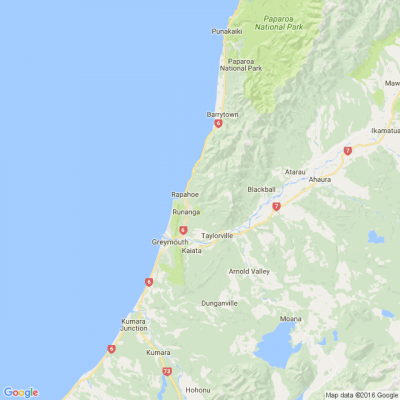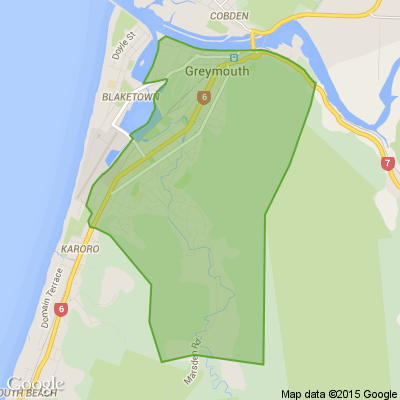Health shuttle funded for one year
From local democracy reporter Brendon McMahon:
Funding to run the Buller health shuttle has been granted for one year.
The shuttle was provided by the Buller branch of the Red Cross from 2012, to transport people 100 kilometres from Westport to Greymouth for medical appointments.
It operated with support from Buller REAP, which co-ordinated patient requested bookings.
"The Red Cross are transitioning away from providing this and similar community transport that they have run throughout the country; the Buller service being the last in the process," a planning and funding update to the West Coast DHB advisory group said this week.
The Buller service was taken on by St John at the beginning of this month and is now known as the Kawatiri Health Shuttle.
"The service has been invaluable to those people who have faced transport issues over the years, and with St John now picking up service provision this is very much welcomed."
The Kawatiri service was funded for one year at this stage, based on Ministry of Health advice given to the board based on the transition to the new health system, DHB staffer Ben Hingston said.
They were "confident" the service would be sustainable beyond the transition period.
St John already operates a similar service in the Grey district and between Hokitika and Greymouth.
Board member Anita Halsall-Quinlan, of Westport, said it appeared the service was being run based on staff availability and asked if there were set days and times it would be available so it retained a broad reach into the community.
Hingston said St John would try to match accessibility to the shuttle with patient appointment times, "but there are no set times".
Board member Helen Gillespie noted it would be reliant on St John being able to co-ordinate volunteer drivers and Hingston said it would be up to that organisation to facilitate the availability of volunteer drivers.
The service would continue to operate at no cost to passengers.
*****
Meanwhile, increased funding has enabled the West Coast District Health Board to double capacity of the Poutini Waiora-led kaupapa Maori Well Child Tamariki Ora services.
A report to the board's advisory group this week said increased funding had meant it would be able to increase staffing from a 0.5 full time equivalent position to almost fulltime, from the beginning of next month.
"The increase in funding will contribute to improved equity of access to kaupapa Maori services for whanau living across the West Coast."
The previous funding level had limited Poutini Waiora's ability to provide a comprehensive service to whanau.
It was expected the additional staffing would improve Poutini Waiora's capacity to deliver Kaupapa Maori Well Child Tamariki Ora services to more whanau and enable "more intensive support" to those already engaged in the service.
*****
Public health funded 'health improvement practitioners' and health coaches will be soon starting work at medical practices in Hokitika and Greymouth.
A report to this week's DHB advisory group said the West Coast Primary Health Organisation's first round of recruitment for the Integrated General Practice Primary Mental Health and Addictions Service had been successful enough to cover practices in the two towns.
Practitioners and coaches would work as part of general practice teams providing people with "immediate support and tools" for wellbeing.
The first practitioner and coach began work at the Westland Medical Centre on May 23.
Additional practitioners would be joining Coastal Health and the Te Nikau Health Centre in Greymouth on completion of their training in July and August.
Recruitment had commenced for the role in Buller.
Time to Tickle Your Thinker 🧠
If a zookeeper had 100 pairs of animals in her zoo, and two pairs of babies are born for each one of the original animals, then (sadly) 23 animals don’t survive, how many animals do you have left in total?
Do you think you know the answer? Simply 'Like' this post and we'll post the answer in the comments below at 2pm on the day!
Want to stop seeing these in your newsfeed? No worries! Simply head here and click once on the Following button.

Poll: As a customer, what do you think about automation?
The Press investigates the growing reliance on your unpaid labour.
Automation (or the “unpaid shift”) is often described as efficient ... but it tends to benefit employers more than consumers.
We want to know: What do you think about automation?
Are you for, or against?

-
9.5% For. Self-service is less frustrating and convenient.
-
43.4% I want to be able to choose.
-
47.1% Against. I want to deal with people.
Have you got New Zealand's best shed? Show us and win!
Once again, Resene and NZ Gardener are on the hunt for New Zealand’s best shed! Send in the photos and the stories behind your man caves, she sheds, clever upcycled spaces, potty potting sheds and colourful chicken coops. The Resene Shed of the Year 2026 winner receives $1000 Resene ColorShop voucher, a $908 large Vegepod Starter Pack and a one-year subscription to NZ Gardener. To enter, tell us in writing (no more than 500 words) why your garden shed is New Zealand’s best, and send up to five high-quality photos by email to mailbox@nzgardener.co.nz. Entries close February 23, 2026.







 Loading…
Loading…